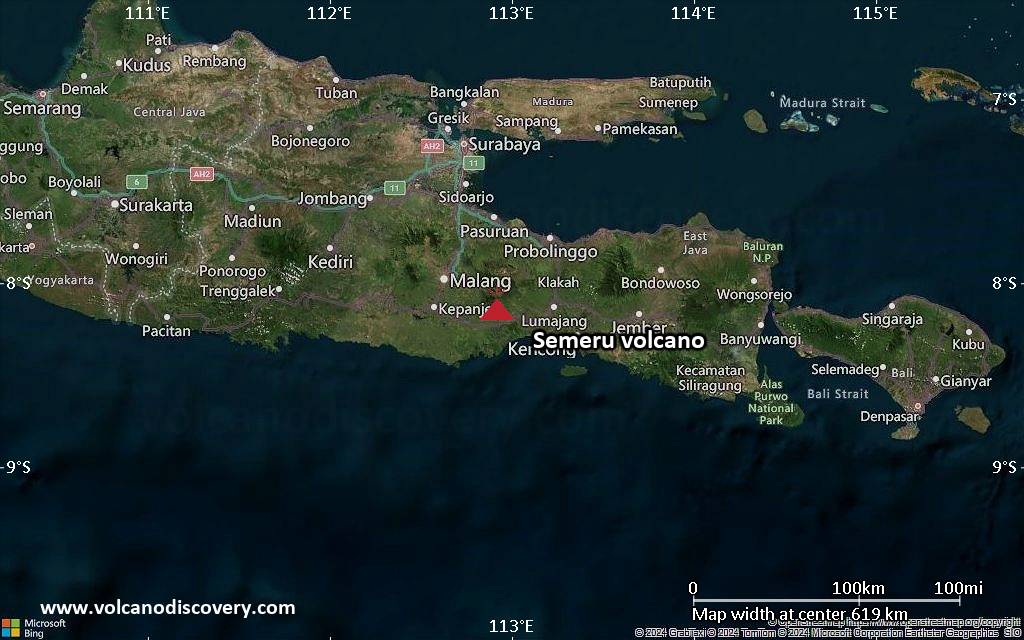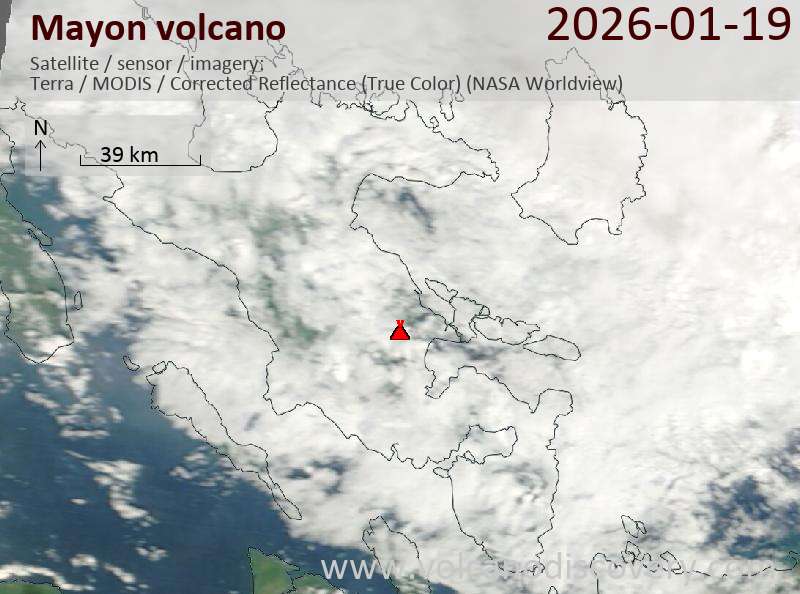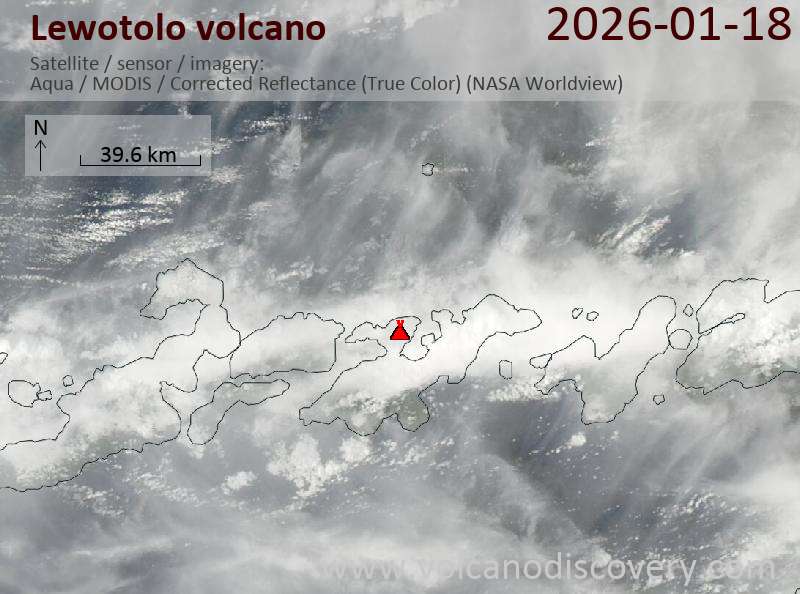On 1/19/2026 6:21:12 AM, an earthquake occurred in Pakistan potentially affecting 20 thousand in MMI&>=V. The earthquake had Magnitude 5.9M, Depth:35km.
Green earthquake (Magnitude 5.6M, Depth:35km) in Pakistan 19/01/2026 06:21 UTC, 2 thousand in MMI V.
Semeru Volcano Volcanic Ash Advisory: VA LAST REPORTED AT 19/0136Z EST VA DTG: 19/0540Z

Volcanic Ash Advisory Center Darwin (VAAC) issued the following report:
FVAU02 at 05:53 UTC, 19/01/26 from ADRM
VA ADVISORY
DTG: 20260119/0600Z
VAAC: DARWIN
VOLCANO: SEMERU 263300
PSN: S0806 E11255
AREA: INDONESIA
SOURCE ELEV: 3657M AMSL
ADVISORY NR: 2026/75
INFO SOURCE: CVGHM, HIMAWARI-9
ERUPTION DETAILS: VA LAST REPORTED AT 19/0136Z
EST VA DTG: 19/0540Z
EST VA CLD: SFC/FL150 S0804 E11251 – S0747 E11321 – S0804
E11328 – S0811 E11255 MOV NE 10KT
FCST VA CLD +6 HR: 19/1140Z SFC/FL150 S0811 E11255 – S0805
E11250 – S0735 E11307 – S0751 E11326
FCST VA CLD +12 HR: 19/1740Z SFC/FL150 S0811 E11255 – S0805
E11250 – S0738 E11315 – S0758 E11328
FCST VA CLD +18 HR: 19/2340Z SFC/FL150 S0810 E11255 – S0805
E11250 – S0735 E11307 – S0751 E11326
RMK: VA NOT IDENTIFIABLE ON CURRENT SATELLITE IMAGERY DUE TO
MET CLOUD, HOWEVER RECENT GROUND REPORTS INDICATE
INTERMITTENT DISCRETE ERUPTIONS ARE ONGOING. VA HEIGHT AND
MOVEMENT BASED ON GROUND REPORTS AND MODEL GUIDANCE.
NXT ADVISORY: NO LATER THAN 20260119/1200Z=
Mayon Volcano Volcanic Ash Advisory: ERUPTION AT 20260119/0140Z VA CLD UNKNOWN REPORTED OBS VA DTG: 19/0140Z

Volcanic Ash Advisory Center Tokyo (VAAC) issued the following report:
FVFE01 at 02:00 UTC, 19/01/26 from RJTD
VA ADVISORY
DTG: 20260119/0200Z
VAAC: TOKYO
VOLCANO: MAYON 273030
PSN: N1315 E12341
AREA: PHILIPPINES
SOURCE ELEV: 2462M AMSL
ADVISORY NR: 2026/54
INFO SOURCE: HIMAWARI-9 PHIVOLCS
ERUPTION DETAILS: ERUPTION AT 20260119/0140Z VA CLD UNKNOWN REPORTED
OBS VA DTG: 19/0140Z
OBS VA CLD: VA NOT IDENTIFIABLE FM SATELLITE DATA WIND FL180 330/11KT
FCST VA CLD +6 HR: NOT AVBL
FCST VA CLD +12 HR: NOT AVBL
FCST VA CLD +18 HR: NOT AVBL
RMK: WE WILL ISSUE FURTHER ADVISORY IF VA IS DETECTED IN SATELLITE
IMAGERY.
NXT ADVISORY: NO FURTHER ADVISORIES=
Lewotolo Volcano Volcanic Ash Advisory: VA TO FL060 REPORTED 18/2218Z EST VA DTG: 18/2220Z to 6000 ft (1800 m)

Explosive activity continues. Volcanic Ash Advisory Center (VAAC) Darwin warned about a volcanic ash plume that rose up to estimated 6000 ft (1800 m) altitude or flight level 060 and is moving at 30 kts in NE direction.
The full report is as follows:
FVAU03 at 22:36 UTC, 18/01/26 from ADRM
VA ADVISORY
DTG: 20260118/2236Z
VAAC: DARWIN
VOLCANO: LEWOTOLOK 264230
PSN: S0816 E12330
AREA: INDONESIA
SOURCE ELEV: 1423M AMSL
ADVISORY NR: 2026/29
INFO SOURCE: CVGHM, HIMAWARI-9
ERUPTION DETAILS: VA TO FL060 REPORTED 18/2218Z
EST VA DTG: 18/2220Z
EST VA CLD: SFC/FL060 S0823 E12327 – S0809 E12321 – S0723
E12449 – S0801 E12502 MOV NE 30KT
FCST VA CLD +6 HR: 19/0420Z NO VA EXP
FCST VA CLD +12 HR: 19/1020Z NO VA EXP
FCST VA CLD +18 HR: 19/1620Z NO VA EXP
RMK: CVGHM REPORT VA TO 400M ABV SUMMIT. VA NOT IDENTIFIABLE
ON SATELLITE. AREA OBSC BY MET CLD. EXPECTED TO DISSIPATE IN
6 HRS. HEIGHT BASED ON GROUND REPORT AND MOV BASED ON MODEL
GUIDANCE.
NXT ADVISORY: NO LATER THAN 20260119/0436Z=
